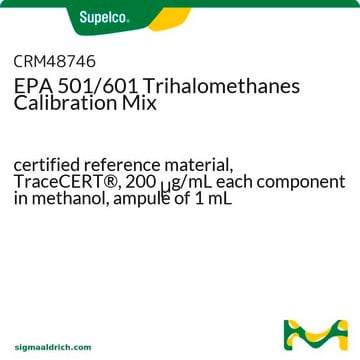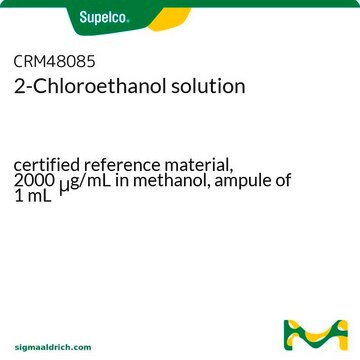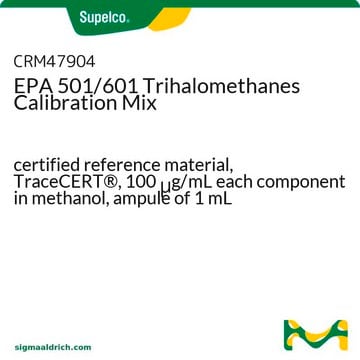CRM48140
EPA 501/601 Trihalomethanes Calibration Mix
certified reference material, TraceCERT®, 2000 μg/mL in methanol, ampule of 1 mL
Synonym(s):
THMs
About This Item
Recommended Products
grade
certified reference material
TraceCERT®
Quality Level
Agency
EPA 601,501.3
suitable for EPA 601
product line
TraceCERT®
CofA
current certificate can be downloaded
packaging
ampule of 1 mL
concentration
2000 μg/mL in methanol
technique(s)
HPLC: suitable
gas chromatography (GC): suitable
application(s)
environmental
format
multi-component solution
storage temp.
2-8°C
Looking for similar products? Visit Product Comparison Guide
General description
US EPA 500 Series methods are analytical methods for identifying and quantifying organic contaminants such as volatile organic compounds (VOCs), pesticides, synthetic organic compounds (SOCs), and trihalomethane disinfection byproducts (THMs) in raw source water, finished drinking water, and drinking water at all stages of treatment.
Application
Other Notes
Legal Information
Analyte
Signal Word
Danger
Hazard Statements
Precautionary Statements
Hazard Classifications
Acute Tox. 3 Dermal - Acute Tox. 3 Inhalation - Acute Tox. 3 Oral - Flam. Liq. 2 - STOT SE 1
Target Organs
Eyes,Central nervous system
WGK
WGK 2
Choose from one of the most recent versions:
Already Own This Product?
Find documentation for the products that you have recently purchased in the Document Library.
Customers Also Viewed
Related Content
This page is intended to make it easier to find the consumables you need based on the analytical method you’re using. Methods included on this page come from the EPA, Standard Methods and ASTM.
This page is intended to make it easier to find the consumables you need based on the analytical method you’re using. Methods included on this page come from the EPA, Standard Methods and ASTM.
This page is intended to make it easier to find the consumables you need based on the analytical method you’re using. Methods included on this page come from the EPA, Standard Methods and ASTM.
This page is intended to make it easier to find the consumables you need based on the analytical method you’re using. Methods included on this page come from the EPA, Standard Methods and ASTM.
Our team of scientists has experience in all areas of research including Life Science, Material Science, Chemical Synthesis, Chromatography, Analytical and many others.
Contact Technical Service







